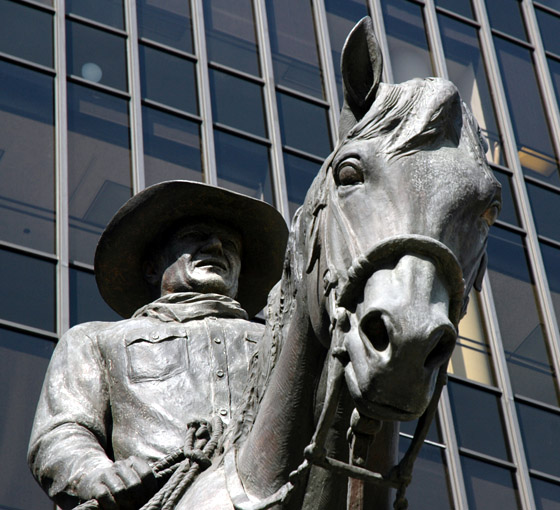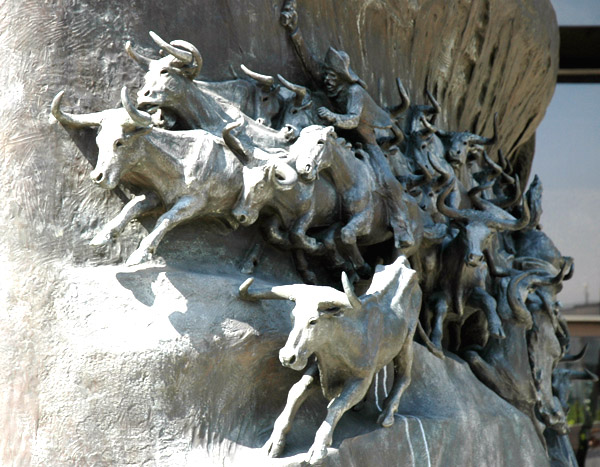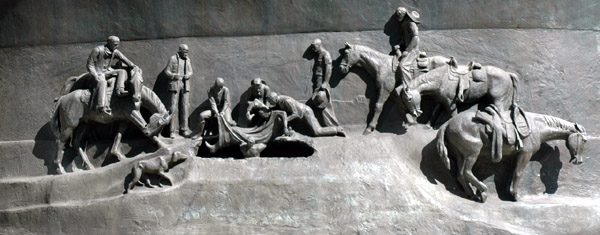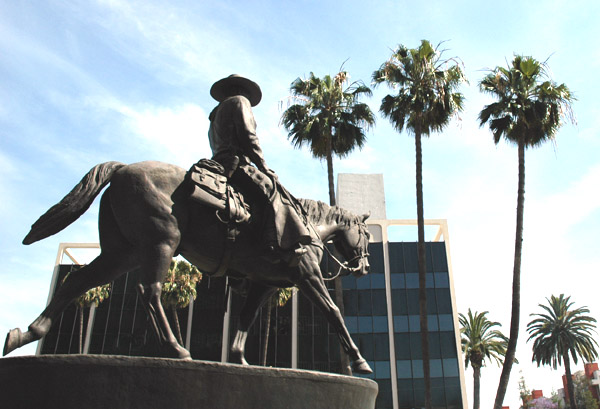Topic: The Economy
Meme Watch: A Touch of Class
Last Monday, May 9, in Our Turn: The Greatest American of All Time (revised and posted today in Just Above Sunset, the parent site to this web log), you would find a discussion of how the Discovery Channel and AOL are teaming up for seven hours of primetime silliness to be telecast this summer. The idea is for us all to make our choice for “the person who has most embodied the American dream, having the biggest impact on the way we think, work and live.” That would be, of course, The Greatest American of All Time. Six days after the initial post here the contest seems to have gained the attention of the big-time web logs – Kevin Drum of Political Animal here and Stephen Bainbridge of UCLA here - and a search on DayPop or Google will lead you to many more.
But there is no prize for being first. Just know that the conversation that began here with Ric Erickson, editor of MetropoleParis, reporting on the French version of this BBC gimmick - Le plus grand Francais de tous les temps - has bubbled up nationally as we prepare for the American version in June. Maybe CNN will do something on it next week, although there are some folks who work at CNN who are most unhappy with AOL – as when their parent company, Time-Warner, was absorbed by AOL the resulting drop in all the stock employees owned was more than a bit painful. Rick, the News Guy in Atlanta, knows all about that. Maybe CNN will take a pass on this.
Oh, and note that Kevin Drum of Political Animal points to the Canadian version of the BBC contest - The Greatest Canadian of All Time. Last November those odd folks up north chose Tommy Douglas, the former Saskatchewan premier, the man credited with being the founding father of Canada's health-care system, as The Greatest Canadian of All Time. Go figure.
Anyway, this week’s national conversation on the net, and maybe beyond, seems to be moving on. The new topic is the idea of class. No, it was not Tom DeLay last week saying that the Democrats offered the country nothing - "No ideas. No leadership. No agenda. And, just in the last week, we can now add to that list, no class." Even if Rush Limbaugh got all excited by this stunning observation, that moment passed. And too, DeLay has a pretty low quotient of class - however one might want to define it - to be saying such things, and I’m pretty sure Limbaugh is not an expert in such matters.
No, we are now talking about class in another sense. Think class warfare, or class mobility, or social caste - that sort of thing.
In the Sunday New York Times, which may or may not be "the nation’s newspaper of record" depending on your point of view, Janny Scott and David Leonhardt give us this - Class in America: Shadowy Lines That Still Divide (May 15) -
Ah, choose your parents very, very carefully.New research on mobility, the movement of families up and down the economic ladder, shows there is far less of it than economists once thought and less than most people believe. In fact, mobility, which once buoyed the working lives of Americans as it rose in the decades after World War II, has lately flattened out or possibly even declined, many researchers say.
The incomes of brothers born around 1960 have followed a more similar path than the incomes of brothers born in the late 1940's, researchers at the Chicago Federal Reserve and the University of California, Berkeley, have found. Whatever children inherit from their parents — habits, skills, genes, contacts, money — seems to matter more today.
Well, if this is so ? and you can wade through the Times pages of tables and graphics here for data showing this is so ? then why does most of the heartland, or whatever we are now calling the fly-over part of America, those on the lower side of the economy, persist in supporting the current folks in power, who cut taxes for the rich and cut programs for those in the middle, and lower? This was discussed in the pages here last month, and it is a mystery. Could it be this?
Conservatism As Pathology
Are Bush supporters literally insane?
Timothy Noah - Posted Monday, May 9, 2005, at 8:40 PM PT SLATE.COM
In the same issue of the New York Times the columnist David Brooks argues not at all!
Ah, so who is delusional?The big difference between poor Republicans and poor Democrats is that the former believe that individuals can make it on their own with hard work and good character. According to the Pew study, 76 percent of poor Republicans believe most people can get ahead with hard work. Only 14 percent of poor Democrats believe that.
Kevin Drum tries to sort it out -
Clap your hands and you can be rich? Actually, I have heard variations on that theme from my conservative friend. (By the way, if you click and pop up the Kevin Drum items you will see he links to all the studies he cites).Ever since World War II, the United States has done a phenomenal job of sorting people by talent. Not a perfect job, but an astonishingly good one nonetheless. All four of my grandparents, for example, would almost certainly have gone to college if they had turned 18 in the 1960s, but that just wasn't in the cards for any of them a century ago. Today, though, as a matter of deliberate policy, the vast majority of people who have the talent to succeed in college get the chance to try. As a result, they moved upward into the middle and upper classes decades ago, and their children have followed them.
But there's only a moderate amount of sorting left to be done. Random chance, both in nature and nurture, will always play a role in life outcomes, but that role has gotten smaller and smaller as the sorting has progressed. The result is that life roles have become more hardened. While incomes of the well-off have skyrocketed over the past 30 years, working and middle class incomes have stagnated. At the same time, the incomes ? and jobs ? they do have are far more unstable than they were a few decades ago. And as recent research indicates, most of them are increasingly stuck in these grim circumstances: every decade, fewer and fewer of them ? and fewer and fewer of their children ? have any realistic chance of moving up the income ladder.
In the face of this, Brooksian paeans to the hardworking Republican poor are little less than appalling. Clap your hands and you can be rich!
What this faux optimism masks is the astonishing real-life pessimism of modern conservatism. Among advanced economies, the United States is by far the richest, youngest, and fastest growing country in the world. By far. And yet, we're supposed to believe that an increase in Social Security costs from 4% of GDP to 6% over the next 50 years is cause for panic. We're supposed to believe national healthcare would bankrupt us ? never mind that our current dysfunctional system is the most expensive and most unfair on the planet. We're supposed to believe that broader unionization would ruin American industry, home of the highest profits and most highly paid executives in the world. We're supposed to believe that the nation's millionaires, having already had their tax rates slashed by a third over the past two decades, are still being bled to the bone by federal taxes.
It's a grim view. But then, modern conservatives are grim people, with little hope that things can ever be made better than they are today. I guess that's why I'm a liberal.
Bottom line ? cut taxes for the rich. We?ll need those tax breaks next week when we make it big.
But it isn?t going to happen, or so that data indicate.
Up at UC Berkeley, the economics professor Brad DeLong has some observations, but as he served in the Clinton administration you may want to discount what he says. After all, that administration ran budget surpluses and suffered from high employment and read GDP growth, so who ARE you going to trust in this?
DeLong?s summary of the Times piece? - Janny Scott and David Leonhardt? They are, I believe, trying to make three points: (a) consumption is more "middle class" than ever before, so that (b) it appears as though class is unimportant, but (c) in reality choosing the right parents matters more than ever in America today?
Then the professor gives us some history -
Cool. Orwell is fun ? and we all like to be compensated by cheap luxuries which mitigate the surface of life. This is the essence of Hollywood, where I live.This argument - that rising standards of living as a whole are making it appear that class is unimportant while in fact class matters more than ever - is an old one. It is one of the centerpieces of George Orwell's The Road to Wigan Pier. Orwell is distressed by the consumption of "cheap " by the relatively poor. He thinks: The system is taking advantage of the relatively poor by enabling them to consume commodities that they think are luxuries, but that in fact are not or are no longer so. It is conning them.
In the middle of the Great Depression in Britain, Orwell expected that the economic catastrophe would bring dismay, discontent, protest, and revolt. Yet it did not do so. Why? Orwell thought that even though "whole sections of the working class... have been plundered of all they really need" by high unemployment, they had also been "compensated... by cheap luxuries which mitigate the surface of life": fish and chips, artificial-silk stockings, tinned salmon, cut-price chocolates, movies, radio, tea.
Note the words: "palliative," "mitigate," "surface." Orwell is in the final analysis not pleased at all by the fact that:
? the youth... for two pounds ten on [installments]... can buy himself a suit which... at a... distance looks... tailored on Saville Row. The girl can look like a fashion plate at an even lower price.... [I]n your new clothes you can stand on the corner, indulging in a private daydream of yourself as Clark Gable or Greta Garbo."
For Orwell writing in the 1930s this pattern of cheap middle-class consumption masks the reality - that the working class has lost relative income, relative wealth, and relative power. It makes tolerable what should not be tolerated: that the upper class has much too large a share of the pie.
And the professor also gives us this -
Any wealthy readers who wish to send me money, please contact me immediately.It may be a very big mistake to think that human happiness is necessarily and significantly increased by piling up larger and larger heaps of material goods. Richard Easterlin in his Growth Triumphant points to evidence from public-opinion surveys that suggests that money does not buy happiness over time or across countries, and believes (though I think he is wrong) that people are no happier in the U.S. today than they are in India today, or were in the U.S. a century ago. Happiness is attained when you achieve your dreams and solve your problems. Material abundance helps you do so, but it also teaches you to dream bigger dreams and pose yourself more complicated problems. Easterlin thus concludes that modern economic growth is a "hollow victory": the "triumph of economic growth is not a triumph of humanity over material wants; rather, it is the triumph of material wants over humanity."
On the other hand, it may not be a very big mistake to think that human happiness consists in expanding our powers and capabilities to accomplish things (not the least of which are maintaining our comfort and satisfying our curiosity), and that wealth is a powerful tool to those ends. There is a standard American response to the claim that money doesn't buy happiness: "Your money doesn't buy you happiness? Then send it all to me. It will help buy me mine."
In any event, you see this conversation - perhaps started by Thomas Frank with book "What's the Matter with Kansas? How Conservatives Won the Heart of America" (see this last July for a discussion) through Tom Noah discussing pathological insanity to David Brooks discussing the optimism of the Wal-Mart clerk in Topeka just knowing he (or she) with be filthy rich any day now and need some tax breaks ? is bubbling up again.
Ah, what would Jonathan Swift say about all this? Who knows? But at Rutgers University in central New Jersey their noted Swift scholar, Paul Fussell, produced what may be one of the better early discussions of these matters - Class: A Guide Through the American Status System - Summit Books; 1st ed. edition (October 1, 1983) ? ISBN: 0671449915 (reviews here)
Fussell, as I recall, wrote a lot about the Kennedy clan in this book. Who knows what he would make of the Bush family, and of the delusional minimum-wage optimists in Topeka? He did once say - ?I find nothing more depressing than optimism.? Yep. And I remember him from his 1965 The Rhetorical World of Augustan Humanism; Ethics and Imagery from Swift to Burke - but don?t we all?
In any event - heads up! The topic this week is class.
Posted by Alan at 16:49 PDT
|
Post Comment |
Permalink
Updated: Sunday, 15 May 2005 16:54 PDT
home









